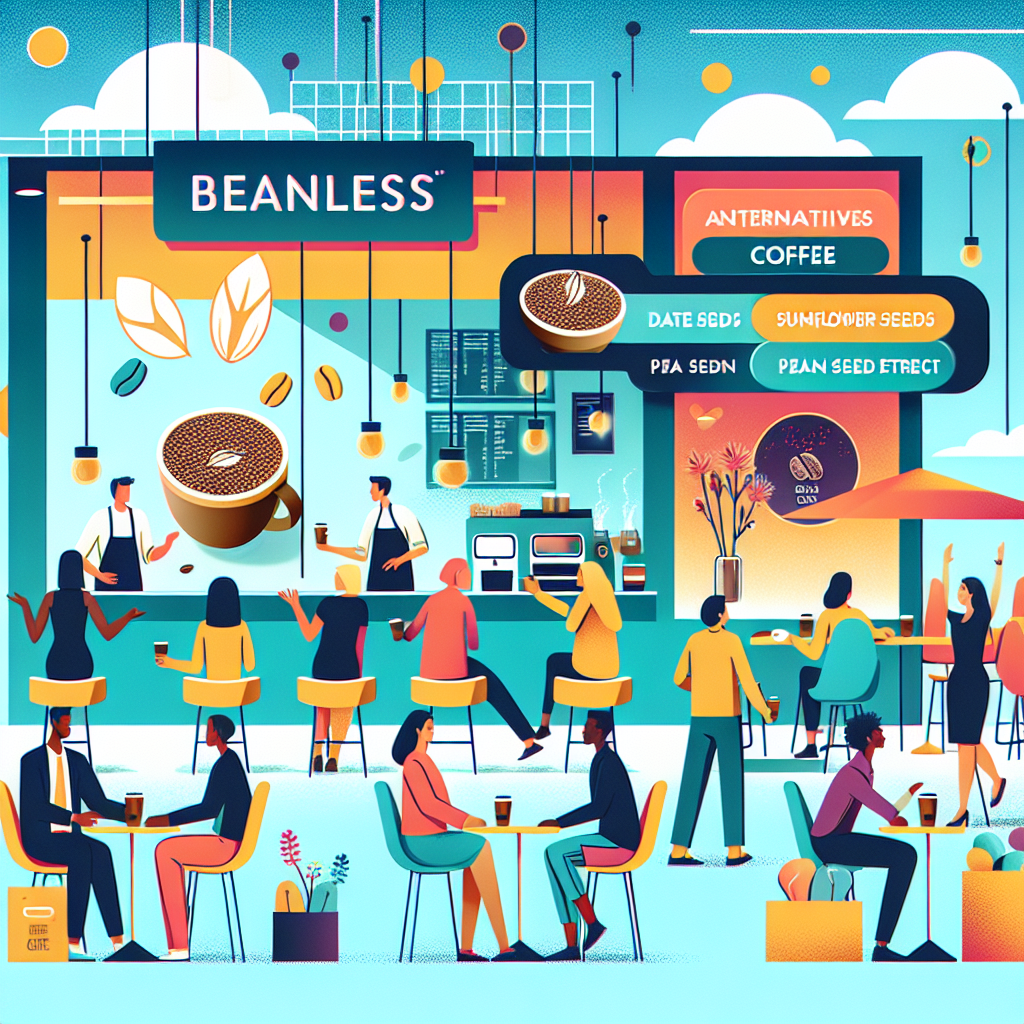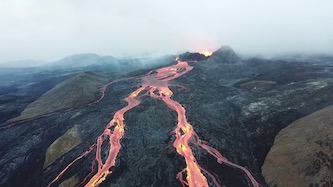A new trend in the coffee industry is emerging with beanless coffee products hitting the market. Atomo, a Seattle-based start-up, is at the forefront of this movement, using ingredients like date seeds, sunflower seed extract, and pea protein to create a coffee-like experience without using any coffee beans. The aim is to replicate the taste, caffeine content, and overall drinking experience of traditional coffee while offering a more environmentally friendly alternative.
Traditional coffee cultivation is a significant contributor to deforestation, prompting the development of beanless coffee as a more sustainable option. The rise in coffee consumption globally, coupled with the effects of climate change on coffee plantations, has led to a growing interest in alternative coffee products. Beanless coffee companies argue that their products could potentially be cheaper than conventional coffee, especially as coffee prices continue to rise on international markets.
While the concept of beanless coffee presents an innovative solution to the environmental challenges posed by traditional coffee production, there are concerns about the impact on coffee farmers and communities that rely on coffee cultivation for their livelihoods. Organizations like Conservation International emphasize the importance of supporting sustainable coffee farming practices and community development initiatives within the coffee sector.
Companies like Atomo and Northern Wonder are leading the way in the beanless coffee market, offering products made from ingredients like date seeds, ramón seeds, and chicory. Other companies are exploring lab-grown or cultured coffee as a potential alternative to traditional coffee production methods. However, challenges remain in terms of scaling up production, regulatory approval, and consumer acceptance of these novel coffee products.
As the beanless coffee industry continues to evolve, questions remain about the future of coffee consumption and the impact on traditional coffee-growing regions. While beanless coffee may offer a more sustainable option for environmentally conscious consumers, the emotional and cultural connections associated with traditional coffee production are also important factors to consider. Ultimately, the rise of beanless coffee products prompts consumers to explore the sustainability and ethics of their coffee choices.
Original news source: New beanless ‘coffee’ emerges but does it taste any good? (BBC)
🎧 Listen:
Slow
Normal
Fast
📖 Vocabulary:
| 1 | emerging | Coming into view or becoming apparent |
| 2 | forefront | The leading or most important position or place |
| 3 | replicate | To make an exact copy or reproduce |
| 4 | cultivation | The process of growing plants for food or other purposes |
| 5 | deforestation | The clearing or removal of forests or trees |
| 6 | sustainable | Capable of being maintained over the long term without harming the environment |
| 7 | consumption | The act of using up resources or goods |
| 8 | alternative | A different option or choice |
| 9 | livelihoods | Means of securing the necessities of life |
| 10 | initiatives | Plans or actions intended to solve a problem or improve a situation |
| 11 | scaling | Increasing in size, amount, or importance |
| 12 | regulatory | Related to rules or laws that control how something is done |
| 13 | acceptance | The act of receiving or approving something |
| 14 | evolve | To develop gradually over time |
| 15 | ethics | Moral principles that govern behavior or conduct |
Group or Classroom Activities
Warm-up Activities:
– Headline Creation
Instructions: Ask students to work in pairs or small groups to create a catchy headline for an article about beanless coffee products hitting the market. Encourage them to be creative and concise in summarizing the key points of the article in their headline.
– Vocabulary Pictionary
Instructions: Write down key vocabulary words from the article (e.g., beanless coffee, sustainable, cultivation) on separate pieces of paper. Have a student pick a word and without saying it, they must draw it on the board while their classmates try to guess the word. This will help reinforce vocabulary retention and comprehension.
– Opinion Spectrum
Instructions: Divide the class into two groups representing “For” and “Against” the concept of beanless coffee. Have students stand on opposite sides of the room based on their opinion. Present statements related to the topic (e.g., “Beanless coffee is a more sustainable option”) and have students move along the spectrum to show their level of agreement/disagreement and discuss their viewpoints.
– Charades
Instructions: Write down actions related to the article on separate pieces of paper (e.g., planting coffee beans, drinking coffee). Have a student pick a paper and act out the action without speaking while the rest of the class guesses what it is. This will engage students in a fun activity while reinforcing vocabulary related to the article.
– Think-Pair-Share
Instructions: Ask students to think individually about the implications of beanless coffee products on traditional coffee-growing regions. Then, pair them up to discuss their thoughts before sharing with the whole class. This activity encourages critical thinking, collaboration, and speaking skills.
🤔 Comprehension Questions:
1. What are some of the ingredients used by Atomo to create their beanless coffee products?
2. How does traditional coffee cultivation contribute to deforestation?
3. Why is there a growing interest in alternative coffee products according to the article?
4. What concerns are raised about the impact of beanless coffee on coffee farmers and communities?
5. Which organizations emphasize the importance of supporting sustainable coffee farming practices?
6. What are some of the challenges mentioned in the article regarding the production and acceptance of beanless coffee products?
7. How do companies like Northern Wonder differentiate themselves in the beanless coffee market?
8. What factors should consumers consider when exploring the sustainability and ethics of their coffee choices, as mentioned in the article?
Go to answers ⇩
🎧✍️ Listen and Fill in the Gaps:
A new trend in the (1)______ (2)______ is emerging with (3)______ coffee products hitting the market. Atomo, a Seattle-based start-up, is at the forefront of this movement, using (4)______ like date seeds, sunflower seed extract, and pea protein to create a coffee-like experience without using any coffee beans. The aim is to replicate the taste, caffeine content, and overall drinking experience of traditional coffee while offering a more environmentally friendly alternative.
Traditional coffee cultivation is a significant contributor to deforestation, prompting the development of beanless coffee as a more sustainable option. The rise in coffee consumption globally, coupled with the effects of climate change on coffee plantations, has led to a growing interest in (5)______ coffee (6)______. Beanless coffee companies argue that their products could potentially be cheaper than conventional coffee, especially as coffee prices continue to rise on international markets.
While the concept of beanless coffee presents an innovative (7)______ to the environmental challenges posed by traditional coffee production, there are concerns about the (8)______ on coffee farmers and communities that rely on coffee cultivation for their livelihoods. (9)______ like (10)______ International emphasize the importance of supporting sustainable coffee farming (11)______ and community development initiatives within the coffee sector.
Companies like Atomo and Northern Wonder are leading the way in the beanless coffee market, offering products made from ingredients like date seeds, ramón seeds, and chicory. Other companies are exploring lab-grown or cultured coffee as a (12)______ alternative to traditional coffee production methods. However, challenges remain in terms of scaling up production, (13)______ approval, and consumer acceptance of these novel coffee products.
As the beanless coffee industry continues to evolve, questions remain about the (14)______ of coffee consumption and the impact on traditional coffee-growing regions. While beanless coffee may offer a more sustainable option for environmentally conscious consumers, the emotional and cultural connections associated with traditional coffee production are also important factors to consider. Ultimately, the rise of beanless coffee products prompts consumers to (15)______ the (16)______ and ethics of their coffee choices.
Go to answers ⇩
💬 Discussion Questions:
Students can ask a partner these questions, or discuss them as a group.
1. What is your opinion on the idea of beanless coffee?
2. How would you feel if traditional coffee cultivation practices were completely replaced by beanless coffee production?
3. Do you think the rise of beanless coffee products will have a positive impact on the environment?
4. Why or why not do you believe that beanless coffee could be a cheaper alternative to traditional coffee?
5. Do you like the idea of lab-grown or cultured coffee as a potential alternative to traditional coffee production?
6. How do you think coffee farmers and communities that rely on coffee cultivation will be affected by the rise of beanless coffee?
7. What are your thoughts on the importance of supporting sustainable coffee farming practices in traditional coffee-growing regions?
8. How do you think the emotional and cultural connections to traditional coffee production will influence the adoption of beanless coffee products?
9. What do you believe are the biggest challenges in scaling up production of beanless coffee?
10. Why do you think some consumers might be hesitant to try beanless coffee products?
11. How important do you think it is for consumers to consider the sustainability and ethics of their coffee choices?
12. Do you think traditional coffee companies should invest in developing beanless coffee products to stay competitive in the market?
13. What impact do you think the rise of beanless coffee will have on the overall coffee industry?
14. How would you feel if you were a coffee farmer facing potential changes in the industry due to the popularity of beanless coffee?
15. Do you think the trend of beanless coffee is a passing fad or a long-lasting change in the coffee industry? Why or why not?
Individual Activities
📖💭 Vocabulary Meanings:
Match each word to its meaning.
Words:
1. emerging
2. forefront
3. replicate
4. cultivation
5. deforestation
6. sustainable
7. consumption
8. alternative
9. livelihoods
10. initiatives
11. scaling
12. regulatory
13. acceptance
14. evolve
15. ethics
Meanings:
(A) A different option or choice
(B) The act of using up resources or goods
(C) Increasing in size, amount, or importance
(D) The process of growing plants for food or other purposes
(E) Related to rules or laws that control how something is done
(F) To develop gradually over time
(G) Means of securing the necessities of life
(H) The leading or most important position or place
(I) To make an exact copy or reproduce
(J) Plans or actions intended to solve a problem or improve a situation
(K) The act of receiving or approving something
(L) Moral principles that govern behavior or conduct
(M) Coming into view or becoming apparent
(N) Capable of being maintained over the long term without harming the environment
(O) The clearing or removal of forests or trees
Go to answers ⇩
🔡 Multiple Choice Questions:
1. What is the main reason behind the emergence of beanless coffee products?
(a) To create a more expensive option for coffee enthusiasts
(b) To increase the caffeine content in coffee
(c) To eliminate the need for coffee consumption
(d) To offer a more environmentally friendly alternative to traditional coffee
2. What ingredients are used by Atomo to create their beanless coffee products?
(a) Coffee beans, sugar, and milk
(b) Date seeds, sunflower seed extract, and pea protein
(c) Wheat flour, chocolate, and almonds
(d) Rice grains, coconut oil, and soy sauce
3. Why is traditional coffee cultivation considered a significant contributor to deforestation?
(a) Due to the need for vast land areas for coffee plantations
(b) Because coffee beans are not environmentally friendly
(c) Because coffee farmers do not care about the environment
(d) Due to the high water consumption of coffee plants
4. What is one of the potential advantages of beanless coffee products over traditional coffee?
(a) They have a stronger flavor profile than traditional coffee
(b) They are only available in limited quantities
(c) They could potentially be cheaper as coffee prices rise
(d) They have a longer shelf life than traditional coffee
5. What is a concern raised about the impact of beanless coffee on coffee farmers and communities?
(a) That their livelihoods may be affected
(b) That they will have too much work to do
(c) That they will become rich from alternative coffee products
(d) That they will have to switch to growing traditional coffee beans
6. Which organization emphasizes the importance of supporting sustainable coffee farming practices?
(a) World Coffee Association
(b) Coffee Farmers Union
(c) International Coffee Organization
(d) Conservation International
7. What are some ingredients used by Northern Wonder in their beanless coffee products?
(a) Coffee beans, sugar, and milk
(b) Date seeds, ramón seeds, and chicory
(c) Wheat flour, chocolate, and almonds
(d) Rice grains, coconut oil, and soy sauce
8. What are some challenges mentioned in the article regarding the beanless coffee industry?
(a) Lack of interest from coffee farmers, high costs, and limited flavor options
(b) Limited availability, expensive pricing, and lack of caffeine
(c) Scaling up production, regulatory approval, and consumer acceptance
(d) Environmental concerns, lack of innovation, and low demand
Go to answers ⇩
🕵️ True or False Questions:
1. Traditional coffee cultivation is a significant contributor to deforestation, driving the interest in more sustainable alternatives like beanless coffee.
2. Conservation International undermines the importance of supporting sustainable coffee farming practices and community development within the coffee sector.
3. Beanless coffee companies argue that their products could potentially be cheaper than conventional coffee due to rising coffee prices.
4. No companies are exploring lab-grown or cultured coffee as an alternative to traditional coffee production methods.
5. Companies like Northern Wonder are not involved in the beanless coffee market, using ingredients such as date seeds, ramón seeds, and chicory.
6. The decline of beanless coffee products deters consumers from considering the sustainability and ethics of their coffee choices beyond just the taste and caffeine content.
7. Beanless coffee is created using ingredients like date seeds, sunflower seed extract, and pea protein to mimic the taste and experience of traditional coffee.
8. Atomo is a Seattle-based start-up leading the way in the development of beanless coffee products.
Go to answers ⇩
📝 Write a Summary:
Write a summary of this news article in two sentences.
Check your writing now with the best free AI for English writing!
Writing Questions:
Answer the following questions. Write as much as you can for each answer.
Check your answers with our free English writing assistant!
1. What are some of the ingredients used by Atomo to create their beanless coffee products?
2. How does traditional coffee cultivation contribute to deforestation and why is beanless coffee seen as a more sustainable option?
3. What are some of the concerns raised about the impact of beanless coffee on coffee farmers and communities that rely on coffee cultivation?
4. What are some of the challenges faced by companies in the beanless coffee market in terms of production, regulation, and consumer acceptance?
5. How does the rise of beanless coffee products prompt consumers to reconsider the sustainability and ethics of their coffee choices?
✅ Answers
🤔✅ Comprehension Question Answers:
1. What are some of the ingredients used by Atomo to create their beanless coffee products?
– Atomo uses ingredients like date seeds, sunflower seed extract, and pea protein to create their beanless coffee products.
2. How does traditional coffee cultivation contribute to deforestation?
– Traditional coffee cultivation is a significant contributor to deforestation, prompting the development of beanless coffee as a more sustainable option.
3. Why is there a growing interest in alternative coffee products according to the article?
– The rise in coffee consumption globally, coupled with the effects of climate change on coffee plantations, has led to a growing interest in alternative coffee products.
4. What concerns are raised about the impact of beanless coffee on coffee farmers and communities?
– Concerns are raised about the impact of beanless coffee on coffee farmers and communities who rely on coffee cultivation for their livelihoods.
5. Which organizations emphasize the importance of supporting sustainable coffee farming practices?
– Organizations like Conservation International emphasize the importance of supporting sustainable coffee farming practices.
6. What are some of the challenges mentioned in the article regarding the production and acceptance of beanless coffee products?
– Challenges mentioned include scaling up production, regulatory approval, and consumer acceptance of beanless coffee products.
7. How do companies like Northern Wonder differentiate themselves in the beanless coffee market?
– Companies like Northern Wonder differentiate themselves by offering products made from ingredients like date seeds, ramón seeds, and chicory.
8. What factors should consumers consider when exploring the sustainability and ethics of their coffee choices, as mentioned in the article?
– Consumers should consider factors like the environmental impact, support for sustainable farming practices, and the emotional and cultural connections associated with traditional coffee production when exploring the sustainability and ethics of their coffee choices.
Go back to questions ⇧
🎧✍️✅ Listen and Fill in the Gaps Answers:
(1) coffee
(2) industry
(3) beanless
(4) ingredients
(5) alternative
(6) products
(7) solution
(8) impact
(9) Organizations
(10) Conservation
(11) practices
(12) potential
(13) regulatory
(14) future
(15) explore
(16) sustainability
Go back to questions ⇧
📖💭✅ Vocabulary Meanings Answers:
1. emerging
Answer: (M) Coming into view or becoming apparent
2. forefront
Answer: (H) The leading or most important position or place
3. replicate
Answer: (I) To make an exact copy or reproduce
4. cultivation
Answer: (D) The process of growing plants for food or other purposes
5. deforestation
Answer: (O) The clearing or removal of forests or trees
6. sustainable
Answer: (N) Capable of being maintained over the long term without harming the environment
7. consumption
Answer: (B) The act of using up resources or goods
8. alternative
Answer: (A) A different option or choice
9. livelihoods
Answer: (G) Means of securing the necessities of life
10. initiatives
Answer: (J) Plans or actions intended to solve a problem or improve a situation
11. scaling
Answer: (C) Increasing in size, amount, or importance
12. regulatory
Answer: (E) Related to rules or laws that control how something is done
13. acceptance
Answer: (K) The act of receiving or approving something
14. evolve
Answer: (F) To develop gradually over time
15. ethics
Answer: (L) Moral principles that govern behavior or conduct
Go back to questions ⇧
🔡✅ Multiple Choice Answers:
1. What is the main reason behind the emergence of beanless coffee products?
Answer: (d) To offer a more environmentally friendly alternative to traditional coffee
2. What ingredients are used by Atomo to create their beanless coffee products?
Answer: (b) Date seeds, sunflower seed extract, and pea protein
3. Why is traditional coffee cultivation considered a significant contributor to deforestation?
Answer: (a) Due to the need for vast land areas for coffee plantations
4. What is one of the potential advantages of beanless coffee products over traditional coffee?
Answer: (c) They could potentially be cheaper as coffee prices rise
5. What is a concern raised about the impact of beanless coffee on coffee farmers and communities?
Answer: (a) That their livelihoods may be affected
6. Which organization emphasizes the importance of supporting sustainable coffee farming practices?
Answer: (d) Conservation International
7. What are some ingredients used by Northern Wonder in their beanless coffee products?
Answer: (b) Date seeds, ramón seeds, and chicory
8. What are some challenges mentioned in the article regarding the beanless coffee industry?
Answer: (c) Scaling up production, regulatory approval, and consumer acceptance
Go back to questions ⇧
🕵️✅ True or False Answers:
1. Traditional coffee cultivation is a significant contributor to deforestation, driving the interest in more sustainable alternatives like beanless coffee. (Answer: True)
2. Conservation International undermines the importance of supporting sustainable coffee farming practices and community development within the coffee sector. (Answer: False)
3. Beanless coffee companies argue that their products could potentially be cheaper than conventional coffee due to rising coffee prices. (Answer: True)
4. No companies are exploring lab-grown or cultured coffee as an alternative to traditional coffee production methods. (Answer: False)
5. Companies like Northern Wonder are not involved in the beanless coffee market, using ingredients such as date seeds, ramón seeds, and chicory. (Answer: False)
6. The decline of beanless coffee products deters consumers from considering the sustainability and ethics of their coffee choices beyond just the taste and caffeine content. (Answer: False)
7. Beanless coffee is created using ingredients like date seeds, sunflower seed extract, and pea protein to mimic the taste and experience of traditional coffee. (Answer: True)
8. Atomo is a Seattle-based start-up leading the way in the development of beanless coffee products. (Answer: True)
Go back to questions ⇧















